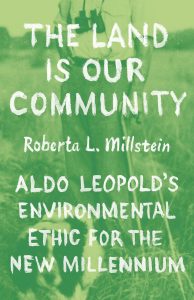5 Questions with Roberta L. Millstein, author of “The Land Is Our Community”
Informed by his experiences as a hunter, forester, wildlife manager, ecologist, conservationist, and professor, Aldo Leopold developed a view he called the land ethic. In a classic essay, published posthumously in A Sand County Almanac, Leopold advocated for an expansion of our ethical obligations beyond the purely human to include what he variously termed the “land community” or the “biotic community”—communities of interdependent humans, nonhuman animals, plants, soils, and waters, understood collectively. This philosophy has been extremely influential in environmental ethics as well as conservation biology and related fields.
In The Land Is Our Community, Roberta L. Millstein reexamines Leopold’s land ethic in light of contemporary ecology. Despite the enormous influence of the land ethic, it has sometimes been dismissed as either empirically out of date or ethically flawed. Millstein argues that these dismissals are based on problematic readings of Leopold’s ideas. In this book, she provides new interpretations of the central concepts underlying the land ethic: interdependence, land community, and land health. She also offers a fresh take on his argument for extending our ethics to include land communities as well as Leopold-inspired guidelines for how the land ethic can steer conservation and restoration policy.
Leopold published A Sand County Almanac seventy-five years ago. The landscape—in terms of climate, ecology, and politics—has changed substantially since then. Why is it important to revisit Leopold’s work now? And how can his land ethic help guide us through today’s challenges?
Since Leopold’s time, our environmental crises have worsened on almost every front: climate heating (and all of its consequences), extinction of species, soil health, pollution, and loss of habitat, to name a few. What Leopold’s land ethic offers isn’t so much a handbook for dealing with specific crises as it is a call to rethink the values that underlie our interactions with our land communities. In that sense, it is timeless. Leopold believed that a change in values was required to improve our relations to the environment, knowing that we wouldn’t preserve and protect something if we didn’t recognize its value.
Leopold’s land ethic grew from the knowledge he gained in wearing different hats throughout his lifetime, learning how we as humans can try to manage and flourish in the world. His hands-on experience taught him to learn from past failures; it taught him humility and a recognition of the limits of our understanding. He was an innovative thinker who anticipated many of the approaches taken by today’s ecologists and conservation biologists.
Two things that emerge from Leopold’s experiences and reflections are 1) a recognition that single-species approaches are almost always doomed to failure and 2) a flexible, practical, and appealing land ethic that extends beyond single-species approaches. The land ethic recognizes that land health is the common goal that humans, particular species, or the land community as a whole share. It can thus provide us with a litmus test—will this action enhance, or at least preserve, land health?—that can be applied to any situation.
For those unfamiliar with the land ethic, what was paradigm-shifting about Leopold’s argument? And how have his ideas been misunderstood?
Western approaches to the environment tended to focus almost entirely on the needs of humans, at best giving some consideration to the rights of other organisms as individuals, most notably with the animal rights movement. Leopold broadened the conversation to include not just our obligations toward other humans and other organisms, but also to include our obligations to the land community as a whole.
Probably the biggest misunderstanding of Leopold’s land ethic was thinking that he was advocating that our only obligation was to land communities, which was taken by some environmental ethicists to imply that individuals should be sacrificed for the good of the whole. However, that couldn’t be farther from the truth. In the essay “The Land Ethic,” Leopold spoke of an expansion (not a replacement!) of our existing ethical views and discussed how human practices such as forestry and farming could be done in a way that was better for the land community. The claim that his view was “fascist,” as some charged, simply does not hold up to scrutiny.
Other misunderstandings that I discuss in the book include misreadings of some of the key terms that Leopold used, such as stability and land community. I provide and defend new interpretations of these terms. He was also misread as advocating that our obligations to land communities were based on our feelings toward them. Leopold recognized that our feelings toward the environment often tended to motivate us to behave better, but there is simply no evidence that he believed our ethics were grounded in such feelings. Instead, I show that his argument for the land ethic is based on a simple argument from consistency: our obligations to the land arise from our interdependencies within the land community just as our obligations to other humans arise from our interdependencies within human communities.
You take another approach to Leopold, integrating philosophy, history, environmental ethics, and biology. How does your analysis differ from previous accounts? And why does that difference matter?
Many of the previous interpretations of the land ethic focused on just two sentences of Leopold’s: “A thing is right when it tends to preserve the integrity, stability, and beauty of the biotic community. It is wrong when it tends otherwise.” These sentences, written for a general audience, were meant to be evocative, not literal in the way that a professional philosopher would intend them. Reading them literally was the basis for one of the misunderstandings I discussed earlier: mistakenly thinking that Leopold was advocating that we should sacrifice individuals for the good of the community. Taking a history and philosophy of science approach toward Leopold’s ideas means that I took into account the context in which Leopold was writing, his life experiences and practices, and his other related writings. I also didn’t assume that Leopold meant what other ecologists of his time meant when they used terms like stability and biotic community; instead, I again drew on context, his life experiences, and relevant writings to provide a more complete and accurate picture of his ideas.
After assuming that Leopold meant by his key terms what other ecologists of his time meant, some interpreters would dismiss Leopold’s views as outdated. However, once we recognize that Leopold was an independent thinker who was at the forefront of ecological thinking, other interpretations become possible. It is then important to show, as I do in my book, that his use of terms, and even his methodology and approach to policy, are not in any way outdated. For this reason, I draw on case studies in ecology and conservation biology throughout the book to show the ongoing relevance of Leopold’s approach.
All this being said, I still needed to draw on relevant insights from environmental ethics. For example, I compare the structure of Leopold’s argument (an argument from consistency) to other established arguments in environmental ethics and discuss the importance of land health for the question of whether land communities can be morally considerable (that is, members of our moral community).
You identify three central concepts of the land ethic: interdependence, land community, and land health. What do these terms mean in light of Leopold’s argument?
Leopold explains that humans, other animals, plants, soils, and waters collectively make up the land community. What makes them members of the same community is their interdependence, deriving from interactions between members whereby effects on one member affect others. These effects might not be direct: sometimes they are indirect, occurring through a chain of interactions. The interactions themselves include standard ecological interactions such as predator-prey interactions, parasite-host interactions, and mutualistic interactions as well as provision of “services” like shelter or shade. These interdependencies make us all vulnerable to what other members of the land community do—or fail to do.
It might seem strange that Leopold would include “negative” (harmful) interactions like predation as part of interdependence, but he came to realize that when humans removed predators like wolves and cougars from land communities, not only did their prey eventually suffer, but because of downstream effects the entire land community, including humans, would suffer. This is where the idea of land health comes in. According to Leopold, land health is the capacity of the land for self-renewal. By self-renewal, Leopold meant the ability of the land to continue to sustain life over time, hypothesizing that soil fertility and biodiversity in the form of long food chains was necessary for this ability.
The land ethic urges us to recognize that just as we are part of interdependent human communities, we are also part of interdependent land communities. In both cases, our fates are intertwined with other members of the community. In both cases, we have obligations to members of our communities as well as to the communities themselves. In the case of land communities, that obligation is to promote and protect land health.
Your book shows the importance of the land community—which includes interdependent plants, animals, humans, and even soil and water—for understanding our contemporary environmental problems. What does that mean, in terms of analyzing environmental challenges?
We are facing a lot of hard choices right now. Some of these choices look different depending on whether we see ourselves only as members of human communities or whether we also see ourselves as members of land communities. For example, there is widespread agreement among scientists that we need to rapidly reduce our carbon production and switch to renewables instead, but there are some ways of switching to renewables, such as deploying solar “farms” in sensitive habitats, that do not respect our land communities. Thinking of ourselves as members of land communities and focusing on the health of these communities reminds us to take into account the full spectrum of our ethical responsibilities and helps to ensure that we are thinking about the long term. After all, failing to respect land communities and thinking short term is a big part of why we are facing so many environmental crises right now.
That being said, our full suite of human interests and values—including aesthetic value, a type of value that was very important to Leopold—and the value of individual living beings more generally are also relevant for our decision-making under the land ethic. What Leopold emphasized is the need to try to harmonize all of these values while still preserving the health of our land communities. That means that destructive interests like those of the fossil fuel industry would not get to hold sway unless they could harmonize with other interests and contribute to the common goal of land health. Integrating interests in this way is no easy task, but as I discuss in my book, there are some contemporary success stories. Difficult or not, the times we live in demand that we never lose sight of our membership in land communities and our obligations to them.

Roberta L. Millstein is professor emerit in the Department of Philosophy at the University of California, Davis.
The Land Is Our Community is available now from our website or your favorite bookseller. Use the code UCPNEW at checkout to take 30% off when you order directly from us.
